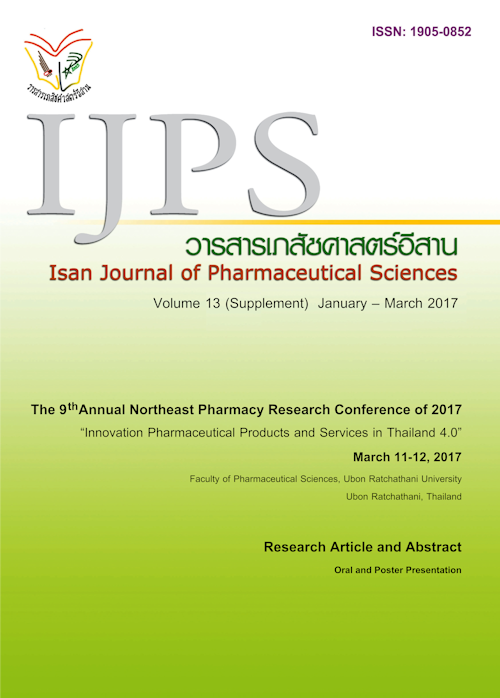Effects of Pharmaceutical Care on Delaying Progression of Renal Insufficiency in Chronic Kidney Disease with Type 2 Diabetes Patients
Main Article Content
Abstract
Introduction: Diabetes is the common main cause of end-stage renal disease. Providing the pharmaceutical care program in patients with early-stage chronic kidney disease (CKD) can delay the progression of CKD. The present study aimed to determine the effect of pharmaceutical care on delaying progression of renal insufficiency among CKD with Type 2 diabetes patients. Methods: An experimental study was performed in patients with CKD stage 1 - 4 concomitant with Type 2 diabetes at Laem Chabang Hospital from April to December, 2016. Eligible patients (n = 168) were randomly allocated either to structured care (SC) group (n = 83) or the usual care (UC) group (n = 85). In the SC group, the pharmaceutical care program was provided to the patients by a research pharmacist who worked with a multidisciplinary team for screening patients with risk factors, evaluating the laboratory values, doctor prescribing and medication dosage adjustment, drug related problem (DRP) identifying and DRP solving also providing education on delaying progression of CKD for the patients. In the UC group, the pharmaceutical care program was not applied to the patients. Both groups were followed up in 0, 4 and 8 months. Results: At the end of the study, the decrement in eGFR of the patients in the SC group as compared with baseline was not statistically significantly different from the UC group (1.10 and 2.38 mL/min/1.732, respectively; p = 0.701) When considering each stage of CKD, the decrement in eGFR of patients with CKD stages 2 and 3a in the SC group was statistically significantly lower than that in UC group (p = 0.012 and p = 0.045, respectively). Albumin to creatinine ratio (ACR) values in both SC and UC groups were not statistically significantly (p = 0.215). The results of the pharmaceutical care process in the SC group showed greater numbers of DRPs found and solved (63.81, 38.13 percent respectively), and patients with CKD stage 1-4 had better control of their risk factors Conclusion: The pharmaceutical care program with the multidisciplinary team has a tendency to delay progression of renal insufficiency in patients with CKD concomitant with Type 2 diabetes.
Article Details
In the case that some parts are used by others The author must Confirm that obtaining permission to use some of the original authors. And must attach evidence That the permission has been included
References
Benjawan Kitkhundee. The Effectiveness of Application by Life Skills Enhancement and Social Support for Smoking Prevention of Junior High School Student in One High School Udonthani Province. Master of Public Health Thesis in Health Education and Health Promotion. Graduate School: Khon Kaen University; 2009
Department of Mental Health. Ministry of Public Health Situation of youth health problem year, .2010-2013. Ministry of Public Health Holistic. Child development Research for Thai children: Department of Mental Health; 2013.
Jariya Niaumsawat. Implement manual of drug abuse in colleges: Bangkok, Ministry of Education; 2014.
Kanchanya Kaewdang. Life Skills Learning Enhancement for drug control by participation of Chiang Mai Rajaphat University student. Master of Public Health Thesis: Chiang Mai Rajaphat University; 2012.
National Statistical Office. Situation of Smoking in Thailand. Bangkok: Ministry of Digital Economy and Society; 2013.
Nontraree Sajjathram. Attitudes and Intention of Ratchaphruek College’s Students to Stop Smoking: Bangkok: Ratchaphruek College; 2013.
Siritida Sripitak et al. The Effectiveness of a Smoking Prevention Program among Middle School Students in Public School,
Suphanburi. Journal of Phrapokklao Nursing College Chantaburi. Vol.23 No.1 38-52; September 2011 - February 2012.
Siriwan pittayarungsrit et al. Thailand Tobacco Consumption Control situation Summary 2012: Bangkok: Jaroendeemuangkongkarn; 2012.
Sombat Dulayarat. Factors Influencing to Smoking Behavior of youth in Maehongsorn Province. Master of Economics Thesis: Chiang Mai University; 2013.
Supaporn Puansurin. Development of a Smoking Prevention Program Among Secondary School Students Using PRECEDE-PROCEED Model. Master of Nursing Science (Community Nursing) Thesis: Chiang Mai University; 2012.
Tisana Khemmani. 14 Teaching Methodology for Professional Teacher: Bangkok: Chulalongkorn UniversityPress; 2008.
Wasinee Khankaewla. Effectiveness of Using Life Skills Program in Smoking Prevention Among Children at the Chiang Mai Home for Boys. Master of Education (Health Promotion) Thesis: Chiang Mai University; 2009.
World Health Organization. Life Skills Education in Schools: Geneva World Health Organization; 1994. World report on violence and health: Geneva World Health Organization; 2002.
Wittchuda Boondantok. Development of Life Skills Patterns for Preventing Alcohol and Cigarette Consumption Among Orphans in Kirsten Jade Rescue Center, Mae Taeng District, Chiang Mai Province. Master of Education Health Promotion) Thesis: Chiang Mai University; 2011.
Uthumphon. na nako r n. Factors related to Smoking behavior among student in Chonradsadornumrung SchoolChonburi Province Province. Master of Education (Health Promotion) Thesis: Burapha University; 2008.


